So, you want delicious, naturally raised, farm fresh eggs on your homestead but cannot decide which is better to raise – ducks or chickens. That question is becoming pondered more and more, as duck keeping (for eggs and not just as cute farm pets), is becoming more popular.
If you live in a rural area, there are not likely any local laws that prohibit you from keeping either ducks or chickens – or place any restrictions on the number or breed of birds which can be kept.
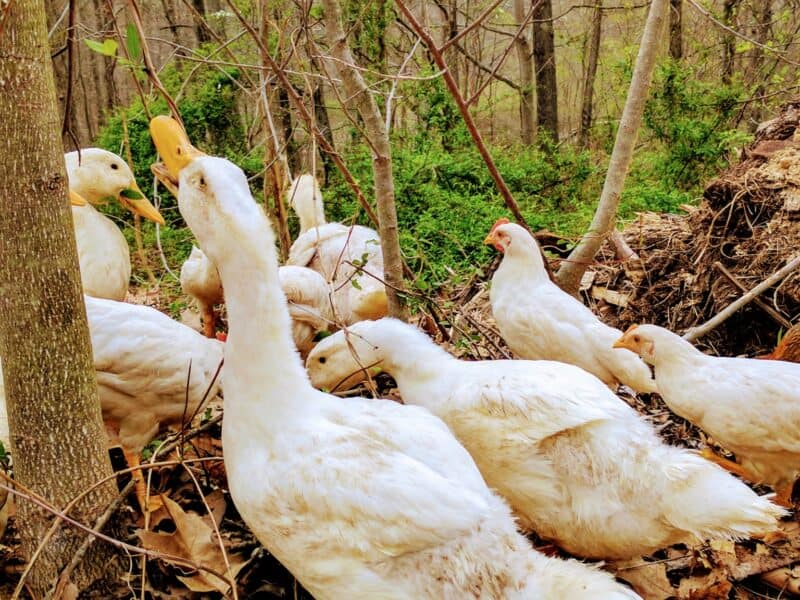
Ducks vs. Chickens Pros and Cons
| Ducks | Chickens | |
|---|---|---|
| Need a pond? | No | No |
| Need a small / kiddie pool? | Yes | No |
| Average egg size | 2.5 ounces (70 grams) | 1.5 ounces (50 grams) |
| Egg laying span | 7 – 9 years | 10 – 12 years, but they slow down production after 2-3 years |
| Egg laying cycle | Regular throughout the day | They lay eggs randomly throughout the day |
| Average egg production | 32 to 52 pounds (14 to 23 kgs) of eggs per year | 22 to 34 pounds of eggs per year (10 to 15 kgs) |
| Can be free-ranged | Yes | Yes |
| Will forage for bugs and greens | Yes | Yes |
| Difficulty in training them | Easier | Harder |
| Likelyhood of suffering frostbite | Less likely | More likely |
| Heat tolerance | Very good | Good |
| Manure usage | Can be used direclty, without composting | Needs composting before it can be used |
| Messiness level | Messier | Less messy |
But, if you live in a suburban or urban area, stringent rules can exist that will play a significant role in deciding which type of egg layers you can raise on your own property.
Making sure you are aware of all laws governing the keeping of livestock in your area, even if you live in a “Right to Farm” state is essential before delving further into which is better for your homestea, ducks or chickens.
It is not wholly uncommon for laying chicken hens to be permitted in some municipal areas, but duck keeping prohibited. There is no logic behind such rules, but they do exist all the same.
Do I Need A Pond To Keep Ducks?
For far too long folks assumed they would need to live on a large rural homestead with a pond like I do to successfully keep ducks. That is just not so.
Ducks can be kept in a coop and run environment just like chickens, as long as they have a water source of some type to clean themselves and swing in.
A plastic baby pool, hard rubber stock tank, or metal stock tank is all that is really required to keep and raise a small flock of ducks for eggs.
If your duck keeping space is limited, check out the video below to learn how to make an efficient, attractive, and self-cleaning duck pond for use as a water feature inside of a run.
Chicken vs. Duck Eggs Nutrition Side-by-side Comparison
| Duck Eggs | Chicken Eggs |
| 2.5 ounces (70 grams) | 1.5 ounces (50 grams) |
| 9 grams of protein | 5 grams of protein |
| 185 calories | 148 calories |
| 14g of fat | 10 grams of fat |
| 1g carbohydrates | 1g carbohydrates |
| 295% RDA of cholesterol | 141% RDA of cholesterol |
| 21% RDA of iron | 10% RDA of iron |
| 17% RDA of vitamin D | 9% RDA of vitamin D |
If you ducks or chickens free range all day, you might find the birds creating their own nest along their favorite stomping grounds. If this happens, especially with chickens, the birds might not want to leave a clutch of eggs they are sitting on to go back into the coop.
You will have to force the birds off of their eggs to either collect them or to gently relocate them back into a coop nest for sitting. Whether or not the hen will return to the eggs to sit them once they have been touched and relocated really depends on the bird.
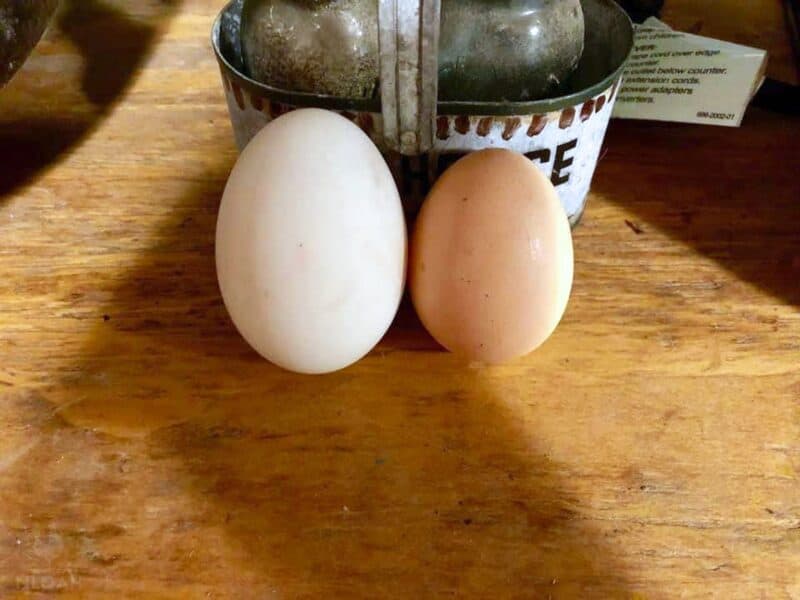
Egg Laying
Duck hens often lay eggs for a far longer span of time than chickens. The average number of egg laying years for ducks is 7 to 9.
Chicken hens generally slow down their egg laying by their second or third year before it draws to a close entirely. From a purely fiscal standpoint, this makes ducks far more economical to keep than chickens.
Ducks Egg Laying Facts
- Ducks frequently lay their eggs between 4 a.m. and 8 a.m. if they are not turned out to free range at dawn. This means duck eggs can easily be collected at the same time every day without missing an egg, or having to complete the chore two or more times to get all of the fresh eggs.
- The peak egg laying season for ducks typically runs from the middle of March through July – but the cycle can vary somewhat by breed.
- Duck hens usually lay approximately 12 to 20 eggs before they consider their clutch complete.
- Although it varies by breed, a duck hen will lay one or two eggs each day until clutch completion is reached and she either sits the eggs or takes a break for a day or so before resuming her laying responsibilities.
- It takes roughly one month to incubate most varieties of duck eggs.
- The best temperature for duck hens to lay eggs is about 40 to 85 degrees F (4.5 to 30 C).
- Duck hens can take a molting break in between laying cycles, but it is far shorter and a less common practice than with chickens – in my personal experience. I now raise only Pekin and Khaki Campbell ducks, and never go a day without some eggs, but my vast array of chicken breeds tend to have consistent molting breaks – with my little Banty hens pausing laying the shortest amount of time.
- Ducks lay between 32 to 52 pounds (14 to 23 kgs) of eggs per year.
- The common duck feed to egg ratio is usually less than two and a half pounds consumed per egg.
Chickens Egg Laying Facts
- Chickens have a 26 hour laying cycle. This means a chicken hen’s laying time varies, with an egg being laid a little bit later each day. This makes chicken laying time unpredictable. Do not expect the hens to have an uniformity to their individual 26 hour laying cycles. This makes collecting all of the farm fresh chicken eggs a tedious chore, and nearly ensuring that eggs will get missed by multiple hens on a daily basis if you do not check nesting boxes multiple times throughout the day.
- A pullet – or young hen, commonly lays just one egg every three to four days until her immature reproductive system is fully complete.
- Once a hen has laid her eggs for around 18 months straight she will take a rest to molt and refresh her feathers. This same cycle will continue to repeat, with the quantity of eggs usually diminishing after each cycle until she stops laying entirely. Both chicken and duck breeds typically go into molt in the late summer and fall.
- The prime egg laying temperature for chickens is between 45 and 80 degrees F (7 to 26 C).
- A hen from a quality egg laying chicken breed is often capable of laying eggs for 10 to 12 years.
- The incubation period for chicken eggs is about 21 to 28 days, with slight variations by breed.
- Chickens lay between 22 to 34 pounds of eggs per year (10 to 15 kgs).
- The chicken feed to egg ratio is roughly a little less than two pounds per egg.
Confined duck hens can make it a lot quicker and simpler to collect eggs from the coop than chicken hens. But, it is rare for a chicken hen to lay outside of her nesting box (as long as it remains clean) even if it is free ranging.
Your coop raised versus free ranging routine may play a significant role in how easily it is to locate eggs and how frequently some are squashed by the waddling birds, when you keep ducks. Chicken hens are typically more tidy with their eggs than ducks.
There are both chicken and duck breeds that are superb layers, but lousy sitters. If you want to raise chicks and ducklings to either grow your flock or as a homesteading side hustle to earn extra money, investing in a breed that is known to both lay and sit their eggs well, of either type of poultry bird, would be a very wise choice.
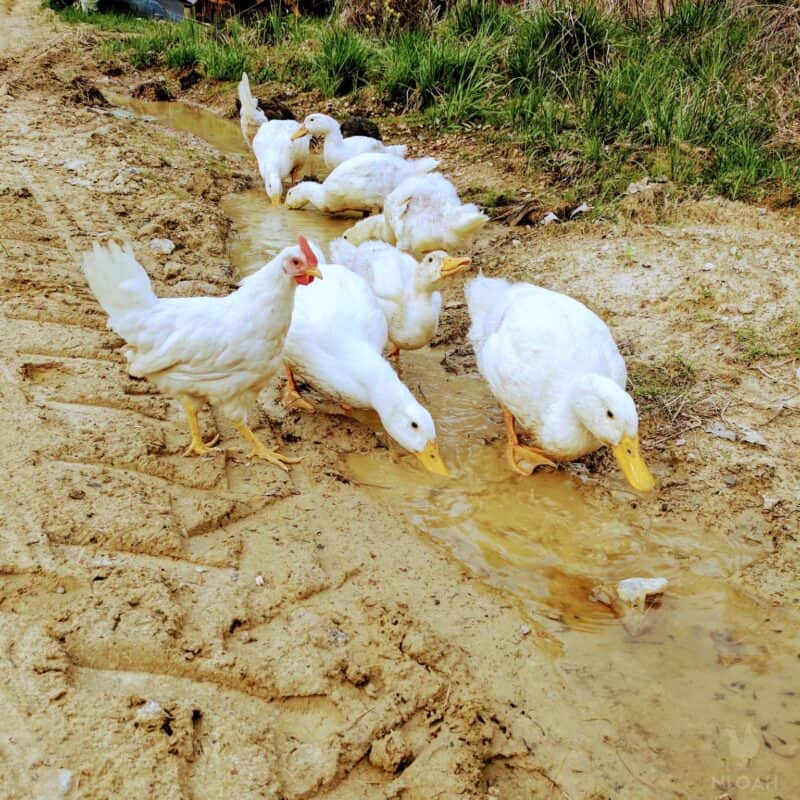
Best Egg Laying Chicken Breeds Quick Reference Chart
| Chicken Breed | Number Of Eggs Laid Per Year On Average | Type Of Eggs |
| Isa Brown | 300 | Large Brown |
| Rhode Island Red | 300 | Large Brown |
| New Hampshire Red | 300 | Large Brown |
| Australorp | 250-365 | Medium to Large White |
| Golden Laced Wyandotte | 200 | Large Brown |
| Red Star | 300 | Medium to Large White |
| White Leghorns | 280 to 325 | Medium White |
| Golden Comet | 250 to 300 | Medium to Large Brown |
| Ameraucana | 250 to 265 | Medium Various Colors |
| Speckled Sussex | 200 to 300 | Large White |
| Barred Rock Plymouth | 200 to 280 | Medium to Large Light Brown |
| Barnevelder | 180 to 200 | Medium Chocolate Brown |
| Welsummer | 150 to 160 | Medium Brown |
| Marans | 150 to 200 | Medium to Large Chocolate Brown Colored |
| Buff Orpington | 150 to 200 | Medium to Large White |
| Hamburg | 200 to 215 | Medium White |
| Ancona | 180 to 225 | Medium to Large White |
Find out which egg-laying chicken breed is right for you in this other article.
Best Egg Laying Duck Breeds Quick Reference Chart
| Duck Breed | Avg. # Of Egg Laid Per Year | Type Of Eggs |
|---|---|---|
| Anacona | 210 to 285 | Large Cream, Green, or Blue |
| Pekin | 200 to 225 | Large or Extra Large White |
| Khaki Campbell | 250 to 345 | Large White or Cream |
| Silver Appleyard | 200 to 265 | Extra Large White |
| Buffs (Orington) | 150 to 225 | Large White or Cream |
| Magpie | 250 to 300 | Large White, Cream, Blue, or Green |
| Indian Runners | 300 to 315 | Large White or Bluish-Green |
| Welsh Harlequin | 240 to 335 | Large Cream |
| Saxony | 190 to 245 | Large White or Bluish-Green |
| Cayuga | 100 to 150 | Large Charcoal |
| Muscovy | 180 to 200 | Large to Extra Large White |
How Many Chicks Or Ducks Do You Need To Raise For Eggs?
Both chickens and ducks should be raised in a flock and not alone. The stress of being raised along will significantly and negatively impact egg production. You should keep a minimum of three ducks or three chickens together to create a flock environment.
If you want to also garner fertilized eggs, the best male to female ratio is one male to five or six females for both ducks and chickens.
Foraging Habits And Pest Control
Both chickens and ducks will forage for their feed if allowed to free range – or if you rotate plantings and introduce beneficial bugs into their coop run.
Foraging is a natural instinct for both types of poultry birds and not only reduces feed costs but also helps insect populations low on your homestead while providing the birds with a protein-rich natural diet.
Ducks tend to be better foragers than chickens, although this can vary by breed in respect to both types of poultry birds. When left to their own devices, ducks will actively forage for a larger portion of their diet, in my personal experience.
Putting poultry birds tunnels in-between garden rows or using a “chicken tractor” to keep the garden pest free is just as feasible of a natural gardening technique for ducks as it is chickens.
But, neither type of bird will differentiate between beneficial bugs and destructive ones… they will eat them all.
Chickens and ducks will forage for both bugs and greens – either wild ones or those growing in your garden or decorative landscape that they can reach.
Because many domesticated duck breeds are not really capable of flying, they are easier to keep out of growing areas you do not want them to have access to with a mere 2-foot tall utility or decorative fence.
While chicken can be voracious bug eaters, they cannot catch and swallow some of the larger insects that ducks can. A chicken can eat small snails or slugs, but a duck can guzzle down even 8-inch long banana slugs!
Predators
Ducks are typically more susceptible to predators because they’re slower to move. Chickens will quickly run for cover and, given their smaller size, will hide in tighter spaces in a pinch.
Raccoons, foxes, snakes, coyotes, and more can strike quickly and without much notice, so speed is essential.
Which Is Smarter, A Duck Or A Chicken?
I have found that ducks possess superior intelligence to chickens – regardless of breed. I can teach a duck our free ranging and put up routine in just a day without issue.
But it is the chickens that get skittish and run like foxes when being trained to come when called, and when to head for the coop for put up.
Even when melding new chickens into an existing flock of ducks and chickens, there are still issues. The follow the leader concept simply doesn’t seem to come naturally to them … at all. Throw a few guineas (awesome barnyard watch “dogs) and all pandemonium breaks loose – except for my sweet and smart ducks that always do what they are told.
If I shake a bread sack (a favorite treat but one that should be given sparingly and only after feeding time) the ducks come in a rush from whatever bush they were foraging under or far away spot in the pond they were mating.
But the chickens, they are in a panicked rush running in all directions – thankfully a few of the more seasoned ones tend to actually head to the coop.
You truly want all of you free ranging poultry birds to run towards you and not away at all times so in case they are injured or sick.
I am not saying all chickens fail at free range training, I have had a few that learn the ropes to a decent degree and do not cause headaches at put up time, it just that ducks are far superior at learning the barnyard routine.
Some keepers use a herding staff of one sort or another, but I just clap my hands and they come running because they associate me with both food and safety.
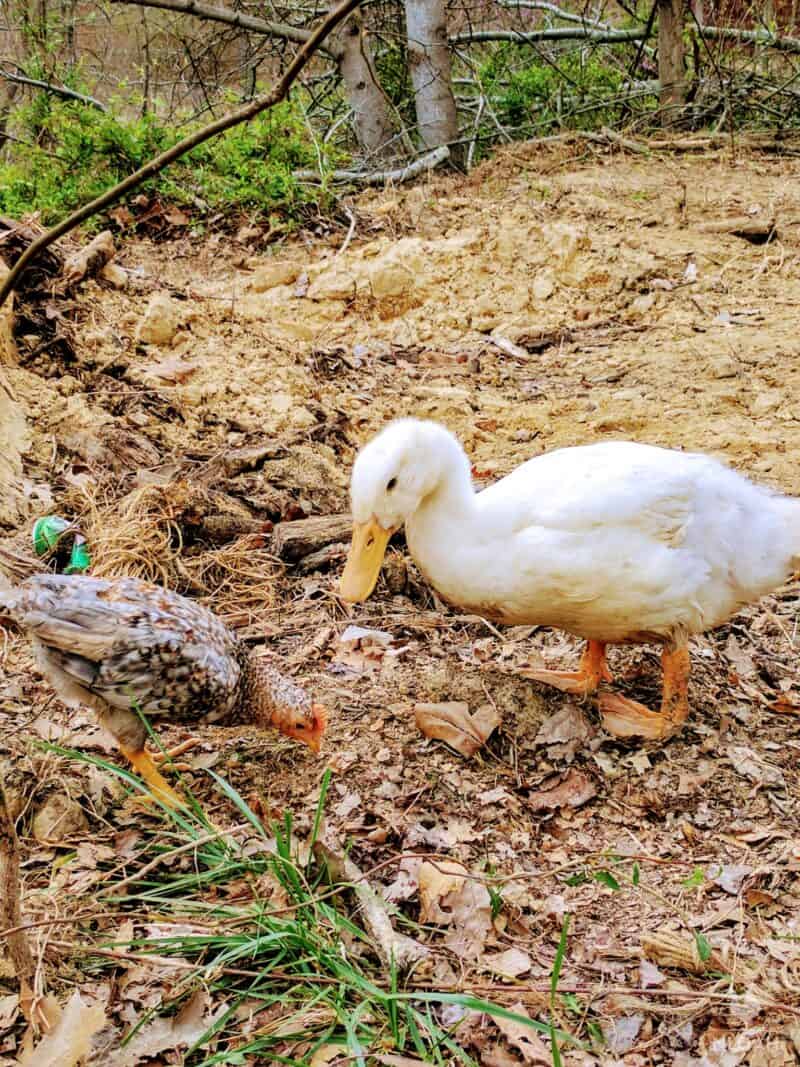
Sometimes, the poultry birds will morph into one large inseparable flock, but other times they will remain two independent but often companion flocks, with the chickens waiting for the ducks at the edge of the pond.
Which Make More Noise, Chickens Or Ducks?
Both ducks and chickens can be noisy. It really depends upon the breed, and on number of birds being kept exactly how quiet or noisy the flock will be.
Roosters are notoriously noisy and, contrary to what some folks believe, they crow throughout the day and not just at dawn – which is their favorite time to make an abundance of noise.
The noise roosters make is why there are often restrictions on keeping them in incorporated areas.
You do not have to keep a rooster if you only want to keep chickens for eggs, and are not planning on hatching any chicks. Chicken hens will cackle throughout the day to each other, they are very social creatures.
If you put a dust bath and boredom busters “toys” in the coop and run the birds will be more content, which helps prevent both excessive noise and bad behaviors.
We have a list of the quietest chicken breeds here.
Chicken boredom busters or enrichment toys will deter the hens and even some roosters, from pecking themselves, each other, fighting, and developing other bad habits that can drive keepers nuts.
Check out the video below if you want to learn how to make some diversion activities for your birds to trick out the coop run on a shoestring budget.
Duck females are often noisier than their male counterparts. Female ducks typically make a honking noise instead of quacking, like drakes – male ducks.
Ducks usually do not need boredom busters like chickens to defray bad behavior. As long as they have some water to splash around in and sun to bask in, they are quite content.
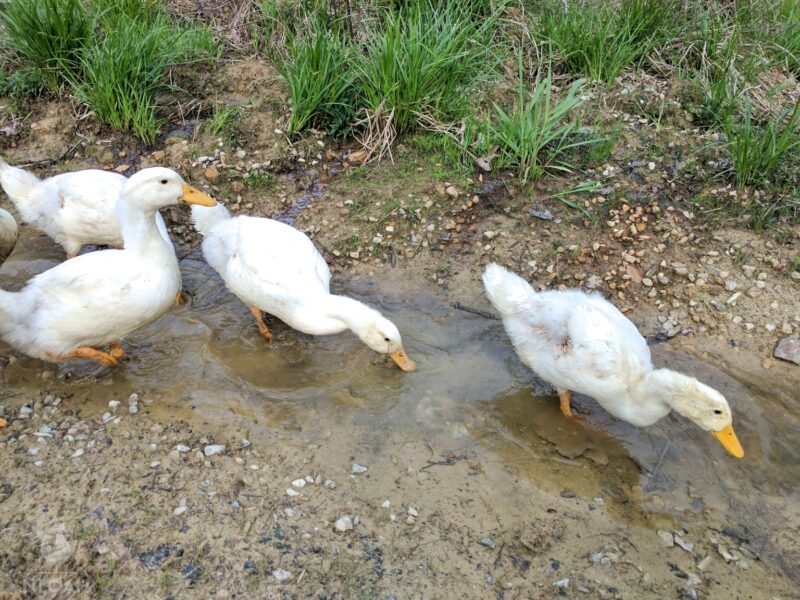
Ducks will seek out any little puddle, hole, or ditch that retains water they can reach, even if they have a large pond to swim in. This is actually quite a wonderful added bonus to keeping ducks on your homestead.
These cute little poultry birds will help drain the puddle of water that will turn to mud as well as any mosquitoes or tadpoles lurking in them. We would be overrun by noisy bullfrogs on our homestead were it not for our free ranging ducks.
Environmental Hardiness and Cleanliness
Ducks may be overall more climate hardy than chickens, but specific breeds of both types of poultry birds are either more or less hardy to both heat and cold.
Ducks, in my experience, are far less likely to suffer frostbite during the winter months than any of the breeds of chickens that I or any of my homesteading friends, have ever kept.
Chickens can be prone to frostbite on their waddles during the cold weather months. A chicken hen will use a lot more energy than a duck hen just trying to keep warm, and therefore have less energy and stamina to lay eggs.
They are also more likely to remain inside the coop on chilly and especially rainy days. The more time the birds spend in the coop the messier it will become in a short amount of time. When a coop gets dirty bacteria and disease can spread rapidly.
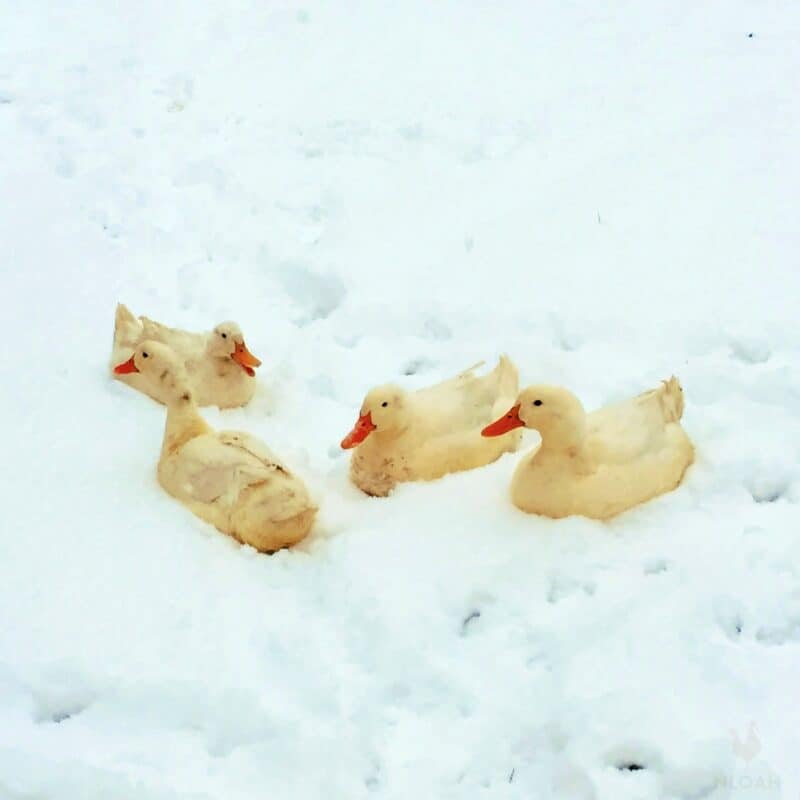
The changes to the season never seem to thwart a duck’s desire to be outside of the coop roaming around. They will peck their rounded beaks into the shallow end of a pond or frozen water feature to get it open enough for them to float in even when the thermometer dips well below 35 degrees F (1.6 C).
Because ducks prefer to be outside more than chickens on average and are not deterred by a cold rain, the coop does not usually get dirty as quickly. But, there is a flip side to this coin.
Ducks are messy, it is just a fact. Their droppings are larger and runnier than chicken droppings. Because of this, and the way they will play in any waterer that allows them to dip more than a beak inside, they will make the floor of the coop but especially the run, a nasty mud messy.
The mess will attract a lot of bugs – but the flock will consume them upon their arrival.
Ducks are also less susceptible to heat stroke and similar troubles when temperatures rise than chickens.
Instead of desperately seeking shade and just a slight breeze to ease their panting like a chicken, ducks will just go for a little swim or relax in the water for hours to cool themselves while remaining quite content on a hot summer day.
Keeping chickens cool and healthy during the summer months often requires putting solar fans in the coop – if efforts to run them out of the coop to keep down on mess and encourage foraging for free feed, fail.
I often freeze fruit or cut up veggies in ice cubes to give to my chickens during the summer to help them cool down.
A coop run will require more shady areas that also keep out the snow and rain, to convince chickens to spend as much time outdoors year round as ducks.
Chicken Meat vs. Duck Meat
Both ducks and chickens can be raised in your backyard as meat birds. Chicken is comprised of both white and dark meat, but duck meat is primarily cuts of meat.
The nutritional content of both duck meat and chicken meat is largely the same. When either type of poultry bird is free ranged or raised as naturally as possible the meat tends to boast a higher concentration of omega-3 essential fatty acids and other beneficial nutrients.
Both ducks and chickens are butchered using the same process, neither is any more difficult than the other to process. The feathers on a duck can often be more dense than chicken feathers, so processing a duck could, in theory, take a few minutes longer than plucking a chicken.
Chicken and Duck Meat Quick Reference Chart
The mature bird butcher weights noted on the chart below are averages. The sex of the bird can sometimes make a difference in size, with hens laying less than either drakes or roosters.
The type of feed as well as length of time a bird can free range for its own food, can also play a role in decreasing or increasing butcher weight.
| Poultry Bird Type And Breed | Butcher Weight |
|---|---|
| Jersey Giant Chickens | 13 Pounds |
| Cornish Cross Chickens | 12 Pounds |
| Buff Orpington Chickens | 10 Pounds |
| Buckeye Chickens | 9 Pounds |
| Bresse Chickens | 7 Pounds |
| Muscovy Ducks | 14 Pounds |
| Jumbo Pekin Ducks | 11 Pounds |
| Saxony Ducks | 10 Pounds |
| Rouen Ducks | 9 Pounds |
| Pekin Duck – Regular | 8 Pounds |
Can You Raise Chickens And Ducks Together?
Can you keep ducks in the same coop and run as chickens? Yep, you sure can. I have read otherwise on some blogs, but in my years of personal experience, the answer always is a resounding yes. I’ve never had a rooster attack a duck or a drake try to mate with a chicken.
I keep ducklings and chicks in a brooder from day one, so they have plenty of time to bond and “imprint” on each other.
I have kept guineas in with the ducklings and chickens also, but only ones that are older and larger than the other birds because they tend to be very fragile birds and grow far more slowly than chickens and ducks.
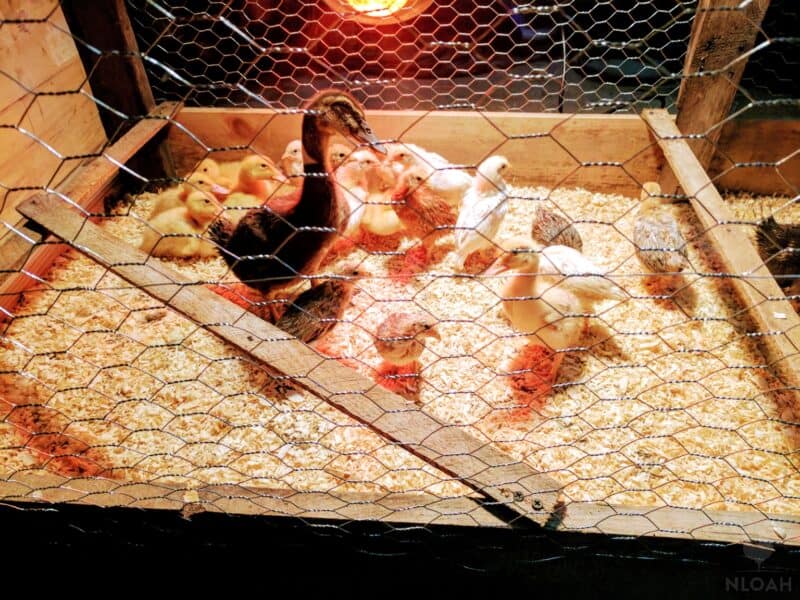
I have never had trampling happen with a duckling and chick, but did have tragedy strike when I put guineas in the brooder when the size difference was just too severe…
If you have never kept ducklings before, you will quickly learn that the brooder will get messier far more quickly. Expect to change bedding every three days to prevent a sour smell and the potential growth of bacteria that cause the birds to become ill or die quickly.
Ducklings can be typically turned out to free range or into the coop by the time they are only three weeks old.
Chicks on the other hand, usually need six weeks until they are large enough and hardy enough against the elements to learn how to forage for their own food.
Starting the chick and ducklings together in the same brooder is the best way to ensure they will cohabitate well in a coop and run environment as they mature. The bedding in the brooder will get dirty a lot quicker because ducks are messy. But that is really the only drawback to raising the baby birds in the same environment from day one.
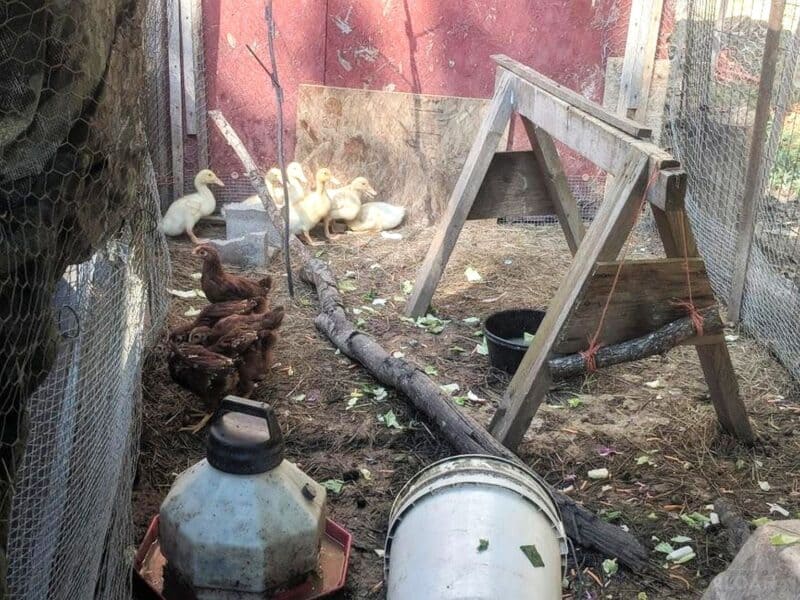
There will be few if any adaptations needed to a chicken coop and run to turn it into a place both chickens and ducks can cohabitate together.
It would be more difficult to turn a duck house into a multiple type of poultry bird housing unit because a duck house is typically not built to be tall since these birds do not have an innate desire to be up high and perch, like chickens.
As long as you have a coop and run large enough to accommodate more birds, the height needed to please chickens and a spot for a water feature to keep the ducks happy, a single structure can suffice.
Even if you have the room for two separate coops or a coop and a duck house, if you plan on free ranging the birds together, they will adapt to one another far better and make put up incredibly less hectic, if they all live in the same place.
Which is better to raise ducks or chickens? I simply cannot answer that question for you. It is totally up to personal preference and the amount of work you are willing to put into husbandry practices, such as winter or heat care for chickens or coop and running cleaning time for ducks.
Ducks are more economical to raise from an egg laying standpoint. But, if you want to keep birds for not just eggs but for meat, the taste of chicken is more traditionally favored by American families.
After weighing the pros and cons of raising ducks vs raising chickens, I found enough benefit in keeping both types of poultry birds that I have large flocks on our homestead.
If you remain unsure, set up a habitat that can accommodate either one, and get just a few of each to determine which best suits the amount of time you have to put into them, your budget, and last but not least, your taste buds.
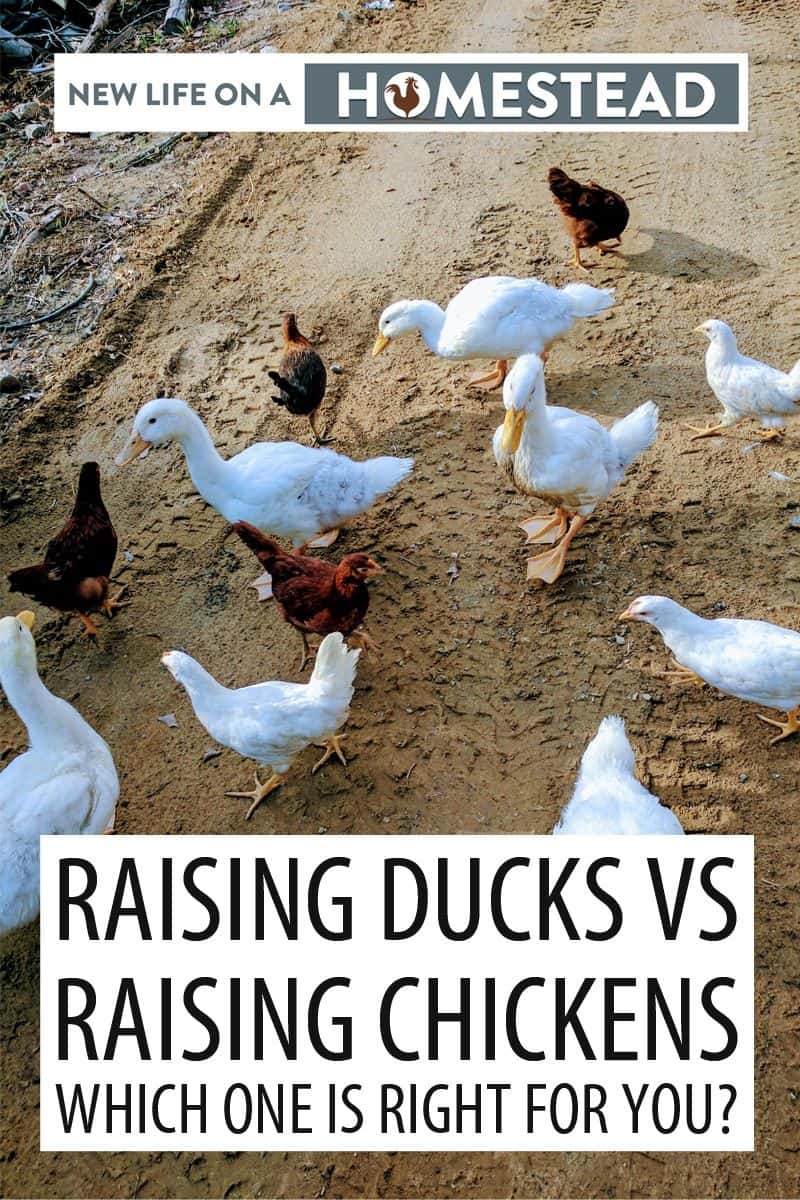

Tara lives on a 56 acres farm in the Appalachian Mountains, where she faces homesteading and farming challenges every single day, raising chickens, goats, horses, and tons of vegetables. She’s an expert in all sorts of homesteading skills such as hide tanning, doll making, tree tapping, and many more.
